On December 27, 1918, the Greater Poland Uprising broke out, one of only five victorious Polish uprisings. Its effect was the annexation of the western territories of Poland to the reborn Republic of Poland. In addition to a huge territorial gain, it also brought the greatest spoils of war in Polish history. How did it happen that it worked?
On November 11, 1918, World War I ended (then called the "Great War") and Poland symbolically regained independence after the years of partitions. In Warsaw, the creation of the state apparatus was immediately started, ministries and ministers were appointed, representatives of state authorities were sent to the area, security services and armed forces were created, and the supervision of the infrastructure:water supply, sewage system, power plants, gas plants was taken over.
It cannot be denied that "there was something to do". The young Polish state did not yet have the strength and means to deal with anything other than itself. Therefore, the matters of territories inhabited by Poles, and still occupied by the invaders, were left for later, although Prime Minister Moraczewski, in his speech of November 20, announced that "joining Wielkopolska will be one of our first tasks" . Meanwhile, in Wielkopolska the water in the kettle was already boiling ...
Many years of preparation
The promises of establishing the Polish state, expressed on November 5, 1916 by the German and Austro-Hungarian emperors, did not receive a favorable response in Greater Poland. The partitioners' proposal did not say anything about the lands where the Piast state was born 900 years earlier . The inhabitants of Wielkopolska expected that the reborn Republic of Poland would be a country encompassing all historical lands, with Krakow, Warsaw, but also with Poznań and Gniezno. They decided that the great war that was just going on was the best chance to revive the country and merge the lands under the partitions into one organism.
During the First World War, about 700,000 Poles found themselves in the German army as a result of conscription of their yearbooks. Among them, apart from Silesians, the largest group was Wielkopolska. They fought in many battles, on all fronts in Europe . During their military service, often for several years, they acquired military experience, perfected their knowledge of the German language and made friends with the Germans, their friends from the trench, dugouts and quarters. Their frontline experience was later used in a useful way during the Greater Poland Uprising, the Polish-Bolshevik War, and the Silesian Uprisings .
When soldiers were stuck in wet trenches on the fronts of the Great War for months, and the fighting powers fought for several kilometers of land, numerous underground organizations were established in Wielkopolska . Some scout teams and units of "Sokol" switched from the peace mode to the "combat-independence" mode at the beginning of the war. On February 15, 1918, expecting an imminent end of the war, the Polish Military Organization (POW) of the Prussian Partition was established in Poznań . Its members joined the German Guard and Security Service (Wacht und Sicherheitsdienst) to train "with a German" and then use the acquired skills for "evil purposes". Local civic committees, which can be considered underground Polish authorities, were also formed.
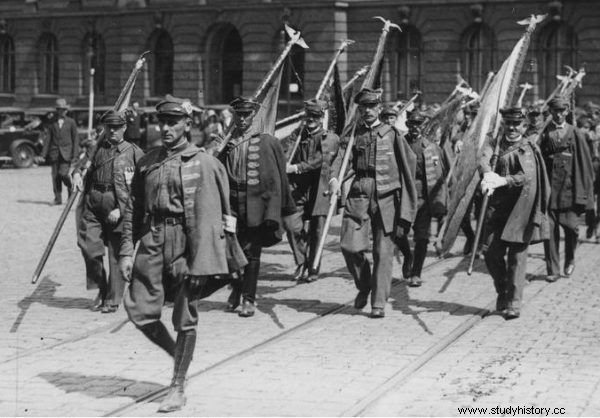
The "Sokół" Gymnastic Society was founded in Poznań in 1886 (photo from 1932)
In the fall of 1918, the November Revolution broke out in Germany. Soldiers disobeyed their commanders, councils of soldiers and workers were formed, and street fights broke out in some cities. These events were another sign that the German state, losing World War I, was falling into ruins . This situation was monitored particularly carefully in Greater Poland. Taught by historical experience, Wielkopolanie did not want to take up arms either too early or too late. Choosing the right moment was crucial.
Obtaining weapons, softening the opponent
Many Polish uprisings failed due to a lack of weapons. Arsenals have not been acquired and ammunition has not been secured. Then, peasant scythes had to be turned into combat scythes, and the cannon positions were stormed with a saber in hand. The words "They went into battle without weapons", sung in one of the songs of the January Uprising, aroused pity rather than recognition in Wielkopolska . This time it was supposed to be different. First of all, the main German arsenals were located and covered by intelligence observation. Weapons were also seized from Polish soldiers coming to Wielkopolska who did not return to the front . Rifles and grenades were also removed from warehouses, where kindly disposed Prussian soldiers (who spoke Polish) kept watch.
In the fall of 1918, the inhabitants of Wielkopolska also carried out activities that today can be considered a "hybrid war". Polish soldiers serving in the German army took control of radio stations and telephone lines, but also entire barracks and arsenals. Already on the night of November 8/9, the Poles appointed a soldier's council and captured the barracks in Jarocin. They also took control of the city, which they managed to maintain until the outbreak of the Uprising. In turn, on December 25, in Buk near Poznań, they stopped and took over a train with weapons heading for Poznań . Everything took place without bloodshed, by negotiation, and the German soldiers were sent back to the Reich.
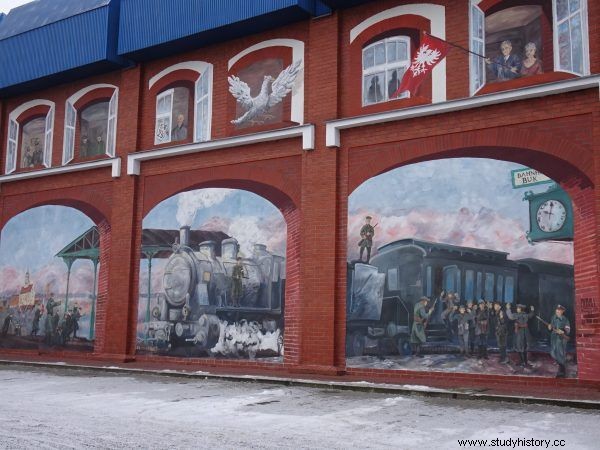
An insurgent mural was unveiled in Buk to commemorate the stop of a train heading for Poznań in 2017
Political pressure was also exerted on German soldiers and civilians residing in Poznań. On November 13, the lace operation "Assassination of the Town Hall" took place, during which the Poles interrupted the meeting of the Executive Committee of the Soldiers' Council and forced the replacement of four Germans with four Poles. Additional pressure on the delegates, apart from loud shouts, was caused by "accidental" shots and the explosion of a grenade that exploded in the Old Market Square. The Poles took control of the Poznań City Command and the V Corps command . In the most important units stationed in Poznań and other cities, Poles were members of the soldiers' councils, thanks to which they had an influence on decisions made and control over the orders given.
In a few cases, Polish telephone soldiers serving in liaison lines or at railway stations communicated over the phone information about the movements of German troops or intimidated the Germans sitting on the other side of the wire. Such situations took place, for example, during the fights for Chodzież, and also during the battle of Zdziechowa. It is worth noting that the telephone communication was not interrupted during the Uprising and could be used by both parties . For some time, the movement of trains also took place normally, until the Germans decided to direct them to routes bypassing the regions of Greater Poland affected by insurgent actions.
Admittedly, the Germans were not blind and deaf, and watched what was happening in Provintz Posen. In the eastern territories of the Reich, they established the Heimatschutz-Ost units. They were to defend the eastern provinces both against the Polish revolt and against the Bolshevik threat. However, the German army was in a state of decay at that time, and the German state was too weak to ensure the security of its eastern territories. This has happened very rarely in the history of Germany.
Paderewski sets the fuse on fire
Meanwhile, Ignacy Jan Paderewski, a pianist and composer, as well as a skillful diplomat and an ardent supporter of Poland's independence for years, was on his way from London to Poland. He set off from England on the ship "Concord" and on December 25, 1918 he reached Gdańsk. Although Warsaw was his destination, he demanded a circular route through Wielkopolska. On December 26, he set off towards Piła and Poznań. In Rogoźno, the Germans tried to stop the train and direct it directly to Warsaw, but thanks to the composer's firm attitude, it failed . Already in Oborniki, Paderewski was greeted with ovation by local Poles, and his arrival in Poznań was a real celebration. A cordon of the Polish People's Guard escorted him to the Bazar Hotel in the city center. Paderewski gave a speech to the inhabitants of Poznań from the balcony, which was an impulse to start the fights that broke out a day later.
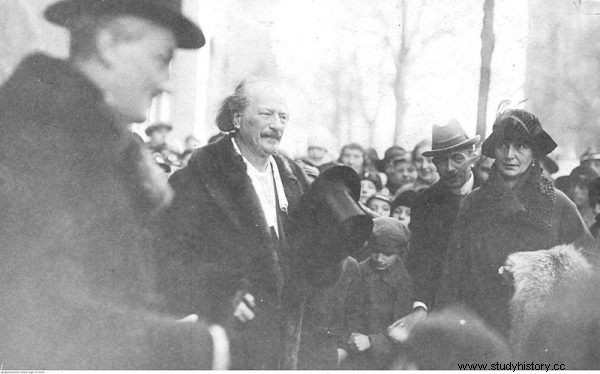
The visit of Ignacy Jan Paderewski was enthusiastically received by the inhabitants of Poznań
On December 27 in the morning in Poznań it was still quiet. In the afternoon hours, the Germans, mainly soldiers of the 6th Grenadier Regiment, carried out a demonstration of force, marching through the city and lifting the Allied and Polish flags . The Polish population of Poznań protested against it, demonstrating a little later but not taking up arms yet. Only after dark, around At 16.40 there was a skirmish near the police presidency. The Germans fired machine guns at Wilhelmowski Square (now Plac Wolności) and Hotel Bazar, the Poles responded with fire. The first two insurgents were shot dead:the better known Franciszek Ratajczak and forgotten for unknown reasons - Antoni Andrzejewski . The skirmish over the police headquarters was resolved by negotiation at night. The Germans were allowed to leave the building, guns in hand, but the insurgents took over an important facility in the city center. There were more situations like this, where there were negotiations instead of shooting at each other during this uprising.
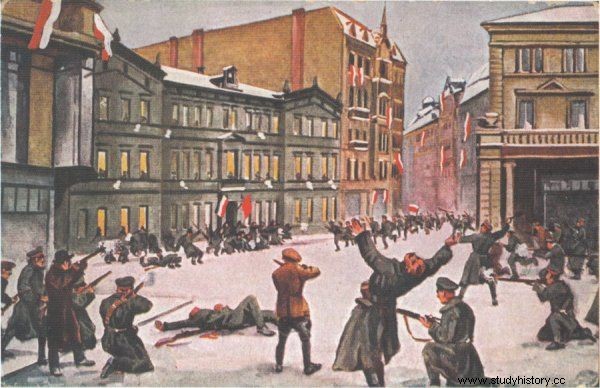
Painting by Leon Prauziński showing the victorious assault on the Police Presidium and the death of Franciszek Ratajczak
Don't wait any longer!
Meanwhile, the slogan "You shouldn't wait any longer" came from Poznań to cities and towns in Greater Poland. Uprising actions have begun in the nearest cities, incl. Buk, Opalenica, Kórnik, Śrem, Środa, as well as further located:Września, Gniezno and Kłecko. The next day (December 28), the insurgents seized the Poznań railway station, post office, Citadel (Fort Winiary), Fort Grolman and the arsenal at ul. Great Garbary. We managed to do it again without loss, by negotiation.
The occupation of the Citadel, the largest fort in Poznań, manned by 900 soldiers, was a tactical masterpiece. It was possible thanks to the actions of Stanisław Jóźwiak, a radio operator from the Citadel. Jóźwiak has been "working" on the Germans for a long time, softening their morale. While serving at the radio station, he had control over the latest radio messages sent and sent to Poznań. At a decisive moment, he persuaded the Germans to lay down their arms and march back to their own people. Thanks to the capture of the Citadel and the radio station located in it, the insurgents gained communication not only with Warsaw, but also with Paris and London in the first days of the fight .
The insurgents in Poznań immediately "cut off the head" of the Germans stationed in the city. The unit of Franciszek Budzyński and Stanisław Nogaj entered the General Headquarters of the 5th Army Corps and arrested General Reichswehr Fritz von Bock und Polach and his deputy general Schimmelpfening. This paralyzed the decision-making process on the German side - there was no one to give orders.
In turn, on the Polish side there was already someone who issued them. The Commissariat of the Supreme People's Council created the General Headquarters of the Insurgent Forces headed by Captain Stanisław Taczak. Taczak, who was passing through in Poznań, became the temporary commander of the uprising, and the fighting began to cover subsequent parts and Greater Poland and take on a more coordinated character.
The uprising spills out
During the Greater Poland Uprising, victories were repeatedly achieved thanks to pressure on the Germans, talks and negotiations, while avoiding losses on both sides. This is how the German weapons and barracks in Śrem, as well as the barracks of the 6th Grenadier Regiment in Poznań, were seized. In the latter case, after firing at the buildings and several unsuccessful attacks, negotiations began, during which the Germans were persuaded to leave the barracks and leave their heavy weapons in them. The grenadiers marched to the railway station in Wola, from where they took a train to Germany. Taken 12 Heavy Machine Guns in the barracks . On the last day of 1918, Poznań was free from the Germans.
Meanwhile, the insurgents were gaining or simply taking power in other cities. They took control of Szamotuły, Trzemeszno and Pniewy. On December 29 they liberated Grodzisk Wielkopolski, Wielichowo and Witkowo, and on December 30 they liberated Wągrowiec and Gołańcz. Ostrów Wielkopolski and Krotoszyn were conquered on December 31 and January 1 thanks to the support of the "Poznańczyk" armored train, which was sent to Greater Poland from Warsaw. On January 2, Gostyń and Nowy Tomyśl were captured. Until January 5, Czarnków, Jutrosin, Kruszwica, Miejska Górka, Strzelno and Wolsztyn were seized.
In many cases, the Germans obtained not only personal weapons:pistols, rifles and grenades, but also heavy weapons:machine guns, as well as heavy guns and ammunition for them. As it turned out, in the later Polish-Bolshevik war, these cannons caused great havoc in the Bolshevik ranks. Interestingly, in the insurgent batteries, and then in the Greater Poland units incorporated into the Polish Army, the commands during the firing of the guns were issued in German!
On the border of Greater Poland and Kujawy, an unusual situation occurred when second lieutenant Paweł Cyms, commanding the attack on Inowrocław, opposed the order to stop the fighting and captured the city. In this case, however, both sides suffered considerable losses in the battle. It was successful again thanks to the expansion of the German army. The Germans did not manage to send support from Bydgoszcz to Inowrocław, because there was a revolt of Polish soldiers serving there in the Bydgoszcz garrison. The insurgents protected themselves against this threat by blowing up the railway tracks on the Bydgoszcz-Inowrocław section.
It is worth noting that the insurgents did not manage to achieve success everywhere, especially that from mid-January the German defense lines "hardened" and they even carried out counterattacks, using, inter alia, armored trains and reconnaissance aviation. The insurgents did not capture, among others Rawicz, Leszno and Zbąszyń. These cities were granted to Poland only as a result of the provisions of the Versailles Treaty. They were taken over in 1920.
Extraordinary uprising gains
The Greater Poland Uprising was different from other Polish insurrections, because during it Poles won huge spoils of war. As a result of the battle for Ławica, then located outside Poznań, they captured the airport and the planes ready for take-off. Also in this case, the Germans were "softened" from the inside by the pilot sergeant Witold Pniewski, who was active in the underground. First, the Germans were cut off the telephone connection to Berlin, but were provided with fresh information from the city and Greater Poland, where the insurgents were only successful.
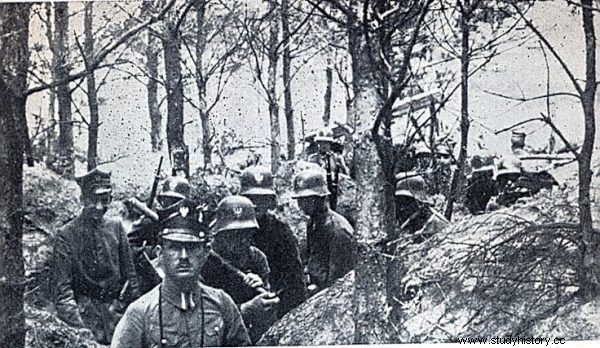
Greater Poland insurgents, January 1919
Later, they offered to surrender the station to the Ławica commanders, and when it was refused, it was decided to launch the attack. On January 6 in the morning of Ławica, the electricity was cut off and the air traffic control tower was fired on from the gun. It only took four shots for the Germans to surrender! The insurgents, in accordance with the traditional Poznań economy, "spared" the planes standing on the apron, and care was taken that the artillery did not damage the apron. Thanks to such reasonable actions, the airport was taken over in a state that allowed for immediate air operations, and a day later a plane with Polish checkerboards on its wings flew over Poznań.
On the Polish side, one was killed, two Germans were also killed, and a dozen were wounded. 110 soldiers were taken prisoner, 26 operational planes and 20 machine guns were captured. In addition, several dozen (about 70) disassembled planes of various types were found in hangars, including Albatros B.II, LVG C.V. and AEG C.IV, Rumpler C, DFW C.V, Fokker D and E, Halberstadt Cl, Hannover CL. II) and observation balloons. In January, several dozen planes were dispatched by trains to Warsaw. They were a significant reinforcement of the created Polish aviation, which for the first few years of the interwar period was based mainly on machines captured in Poznań.
The war booty from Ławica, although extremely valuable, was overshadowed by another insurgent booty, which was remembered as the greatest war gain of the Polish Army. In the airship hall in Winiary, the insurgents seized about 300 disassembled planes and balloons. Only the airships were not captured, because during the Greater Poland Uprising they were no longer stationed there. It is estimated that in Ławica and in the "Hala Zeppelinów" insurgents took over aviation equipment worth up to 200 million German marks!
Let us add that the insurgents not only captured German planes, but also ... bought them . In a few cases, demoralized German pilots who wanted to get rich, landed on the Polish side with the latest machines, received cash for them and a return ticket to Germany. In this way, at least a few Fokker D. VII planes were purchased.
There were also "smaller" spoils, which, however, greatly strengthened the insurgent troops, and later also our army. On February 7, the insurgents from Budzyń seized the modern Ehrhardt M17 armored car. The vehicle under the name "Pułkownik Grudzielski" first joined the Greater Poland Army, later took part in the Polish-Bolshevik war, it was also sent to support the Silesian insurgents.
On February 18, as a result of bloody fighting near Rynarzewo, the insurgents captured an armored train. It was stopped thanks to two mines installed on the tracks by insurgent sappers. The first mine was detected by the Germans, but the second one exploded. In the assault on the train, the insurgents pushed the Grenzschutz unit of 400 soldiers out of it. After repairs and modernizations carried out in Zakłady Cegielskiego, the train was incorporated into the Polish Army under the name "Danuta".
February 16, 1919
The Greater Poland Uprising lasted only 52 days. 2,289 insurgents died there, and over 6,000 were injured. The Germans put their losses at 1,240 people. On February 16, the fighting under the "Peace in Trier" signed by Germany with the Entente countries was formally ended. As a diplomatic recognition of the victory of the Greater Poland insurgents, the Treaty of Versailles signed on June 28, 1919, as a result of which almost all of Greater Poland returned to Poland. It is amazing that the date of February 16, 1919 is completely unknown in Poland. Even in Poznań and Greater Poland, it is not often remembered about. It is a pity, because it is certainly one of the most important and glorious dates in the history of Polish military and Polish history.
